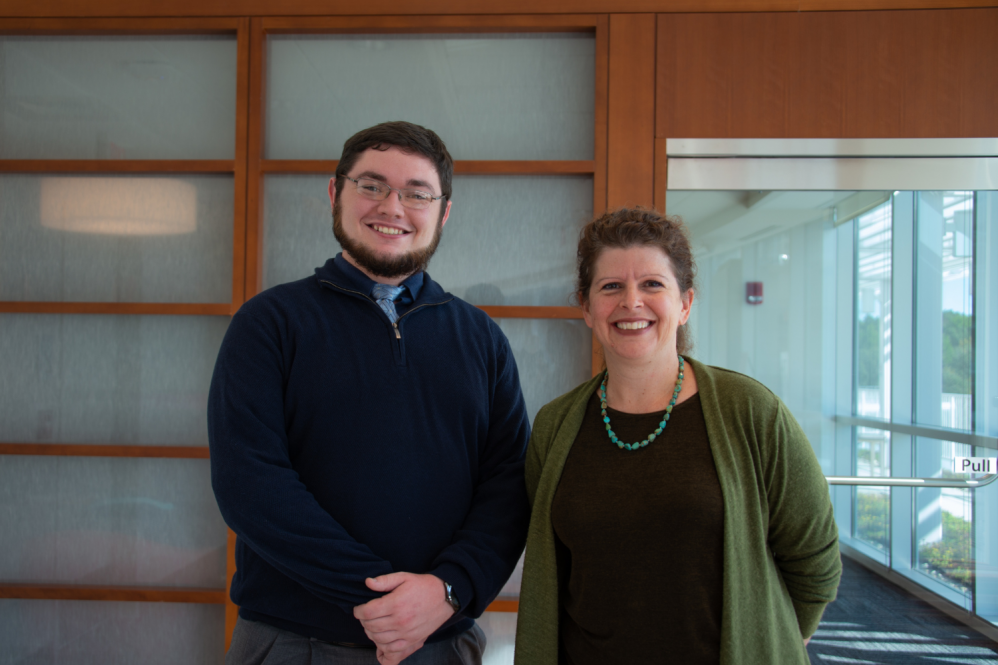When it comes to breast cancer, early detection has long been the focus. But as science evolves, prevention is becoming more personal guided not just by mammograms, but by our DNA.
At UConn Health’s Carole and Ray Neag Comprehensive Cancer Center, Jennifer Stroop and Connor Linehan, board certified genetic counselors are helping patients better understand their risk for breast cancer through genetic testing, a field that has grown dramatically in both accuracy and accessibility over the past decade.
“Genetic testing doesn’t predict your future,” says Stroop, “but it helps you make informed choices today. The more we know about your personal and family history, the more we can tailor screening and prevention to fit your risk.”
While genetic testing for breast cancer risk isn’t new, the scope of what experts can now look for has changed significantly.
“There are currently 13 genes known to be associated with an increased risk of breast cancer,” explains Stroop. “What’s new is that major organizations like the American Society of Clinical Oncology (ASCO) are now encouraging broader genetic panels to include all of these genes.”
These updated recommendations, along with improved insurance coverage, have made testing more common and more comprehensive. It’s also prompted many people who had genetic testing prior to 2013 when only a few genes were included to return for what’s called updated genetic testing.
“We’re still seeing patients who had testing before 2013,” says Stroop. “Those earlier tests were relatively limited, so we’re encouraging people seen roughly ten years ago or more to follow up with their providers about the option of updated testing.
Genetic testing isn’t for everyone, but certain family and personal history factors can raise concern.
“If there’s a close relative diagnosed with breast cancer before age 50, or if there are three or more relatives with breast cancer at any age, those are strong indicators that genetic testing might be useful,” says Stroop. “Pancreatic, ovarian and prostate cancers can also indicate possible risk.”
Additional factors such as breast density, age at first period, and reproductive history are also part of the overall risk assessment. Many patients are referred for testing after completing a family history questionnaire at their mammogram appointment or through their primary care provider or OB-GYN.
Testing itself is simple, a blood or saliva sample is all that’s needed.
A positive genetic test result does not mean a person will develop breast cancer, but it does mean their lifetime risk is higher than average.
“These tests help us understand risk on a spectrum,” says Stroop. “There are high-risk genes and more moderate-risk genes, and we match the screening approach to that level of risk.”
For some, that means alternating mammograms and breast MRIs every six months rather than the standard annual mammogram. Others may qualify for additional follow-up through UConn Health’s High-Risk Breast Program, led by Dr. Dana Scott.
“We walk patients through their results, explain what they mean, and help coordinate with their physicians to plan next steps,” says Stroop.
According to the Connecticut Breast Health Initiative, Connecticut has some of the highest breast cancer screening rates in the country which is credited to both public awareness and state legislation that supports coverage for screening and diagnostic mammograms.
“The more people who have access to screening, the more likely we are to catch something early,” she says. “That doesn’t mean there’s more cancer it means we’re finding it sooner.”
She notes that one of the biggest shifts she’s seen is simply that patients and providers are more proactive than ever before.
“People know their family history, they ask about genetic testing, and they’re often more willing to take that step,” says Stroop. “That awareness alone can make a huge difference.”
For those wondering if genetic testing is right for them, Stroop’s advice is simple: start with a conversation.
“Talk to your family about who’s had cancer and at what age they were diagnosed,” she says. “That information helps us make the best recommendations for your care.”
And for anyone who had genetic testing before 2013, she adds, “It may be time to get it updated. The science has advanced and that information could change your screening plan.”
To learn more about genetic counseling and hereditary cancer screening at UConn Health, visit the UConn Health Hereditary Cancer Program or talk to your provider about whether genetic testing may be right for you.



